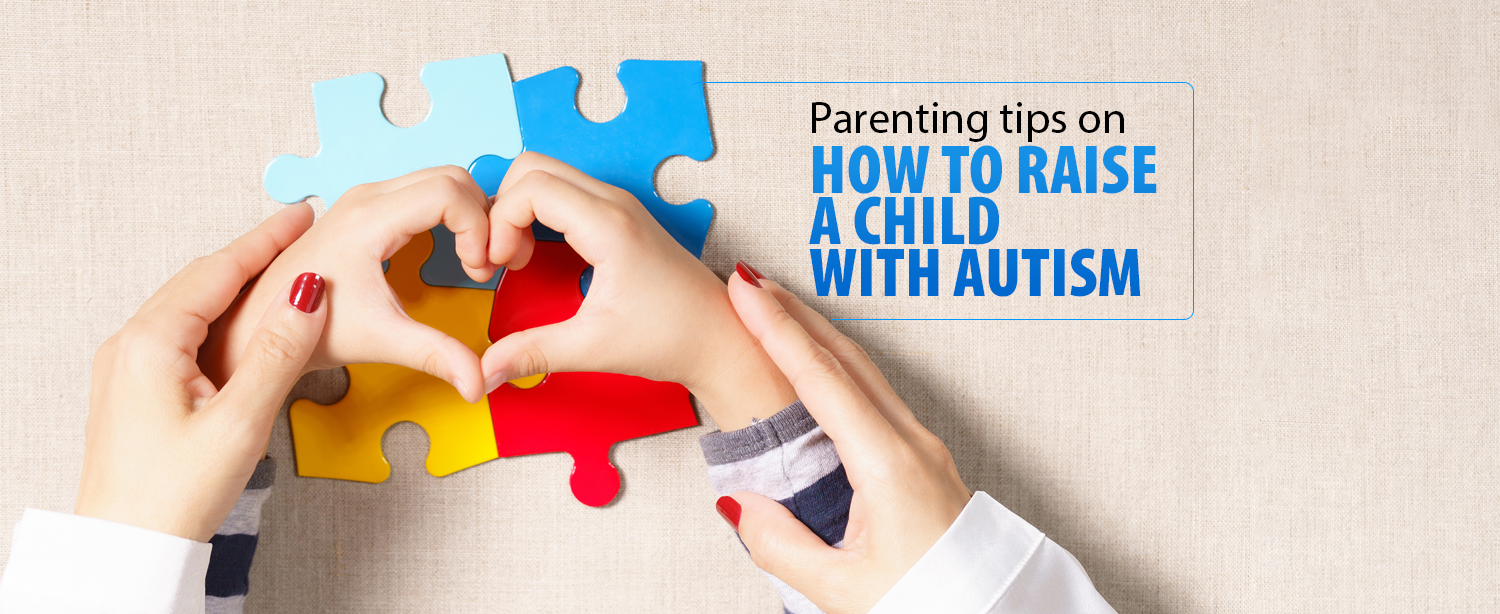Autism spectrum disorder (ASD) is a neurological and developmental condition impacting individuals’ social interactions, communication, learning, and behavior. While diagnosis can occur at any stage of life, it is often recognized as a “developmental disorder” due to the manifestation of symptoms typically within the initial two years of life.Parenting a child with autism spectrum disorder (ASD) can prove to be challenging and requires immense patience. The right tools and strategies along with supportive medical care can help you navigate this journey with confidence and optimism.
Tips for Parenting a Child with Autism
- Focus on the Positive
Just like any child, those with autism respond well to positive reinforcement. Praising their good behaviors not only boosts their confidence but also strengthens your bond. Be specific in your praise, highlighting exactly what behavior you appreciate. - Stay consistent and on Schedule
Routine is crucial for children on the spectrum. Consistency in guidance and interaction helps them practice and apply what they learn from therapy more effectively. Coordinate with teachers and therapists to align on techniques and methods, creating a seamless transition between home and therapy sessions. - Put Play on the Schedule
Engage your child in activities purely for fun, devoid of educational or therapeutic agendas. Playtime not only fosters joy but also provides an opportunity for your child to open up and connect with you on a deeper level. - Embrace Quirks and Talents
Every child with ASD possesses unique strengths and talents. Celebrate these quirks and talents, redirecting repetitive behaviors into more socially acceptable outlets. Recognizing and nurturing these strengths can pave the way for a fulfilling future. - Enhance peer Relationships
Social interaction is essential for your child’s development. Facilitate opportunities for peer interaction, whether through shared activities or structured social settings. Encouraging meaningful friendships can significantly impact your child’s social skills and overall well-being. - Recognize the need for Breaks
Recognizing the need for breaks is a crucial aspect of parenting children with autism. These breaks serve as essential opportunities for children to recharge and regulate their sensory input. It’s important to observe your child for signs of distress or overwhelm. When you notice these indicators, provide a safe and quiet space where your child can relax and self-regulate. - Collaborate with Schools
Schooling plays an essential role in your child’s development, as with any child. Autistic children require additional care and attention. Advocate for your child’s needs within the educational setting, ensuring they receive the support and accommodations necessary for their success. - Expose your Child to the Outside world
When faced with your child’s unpredictable behavior, you might be tempted to avoid certain situations altogether. However, incorporating them into routine activities such as grocery shopping or visiting family or friends can gradually acclimate them to their surroundings. - Teach Adaptive Skills
It can often be difficult for autistic children to apply various skills in different contexts. Help your child generalize newly learned skills to different situations by employing a patient and consistent approach to teaching and reinforcement. - Get support
Establish a supportive community of friends and family members who understand your child’s diagnosis. Do join support groups for autism as they provide a platform to exchange advice, connect with others facing similar challenges, and seek solace. Additionally, consider seeking individual, or family counseling to navigate the complexities of raising a child with autism.
Parenting a child with autism requires patience, resilience, and an unwavering commitment to understanding and supporting your child’s journey. By focusing on strengths, fostering positive relationships, and embracing their unique qualities, you can unlock your child’s full potential and create a nurturing environment.
Autism Care at Kokilaben Dhirubhai Ambani Hospital
Addressing the core symptoms of autism requires a multifaceted approach encompassing medication, therapy, and comprehensive care. At the Autism Clinic at Kokilaben Dhirubhai Ambani Hospital we are dedicated to providing exceptional support to both the child and their family, from diagnosis through therapy. Our team offers a range of therapeutic interventions, including behavioral, occupational, and speech therapies, tailored to meet the unique needs of each individual. Additionally, our home-based programs extend our services to families outside Mumbai. With our specialized autism package, including specialist consultations and essential investigations, we strive to ensure that every child receives the holistic care they deserve to thrive. Please find below website for more details: https://www.kokilabenhospital.com/departments/clinicsatkh/autismclinic.html


